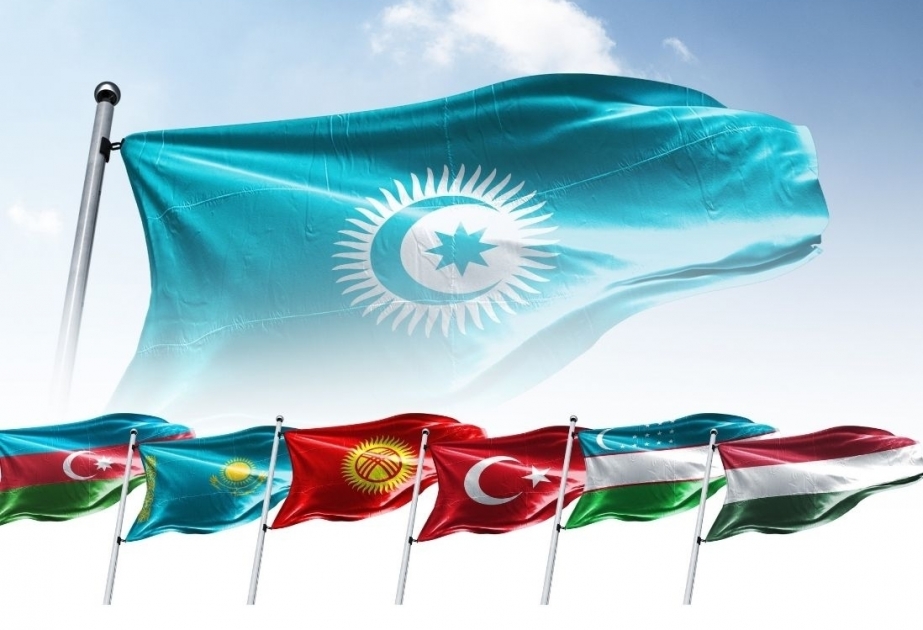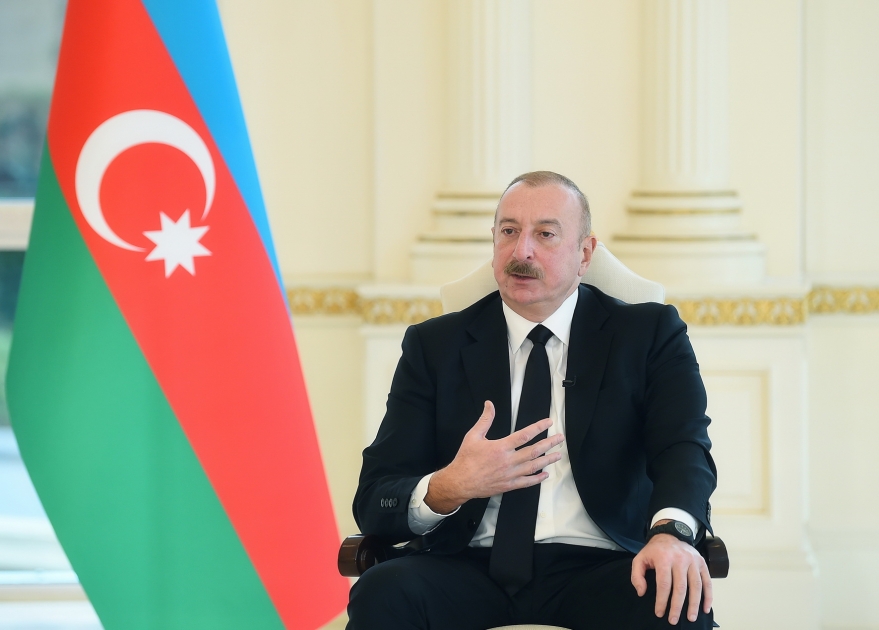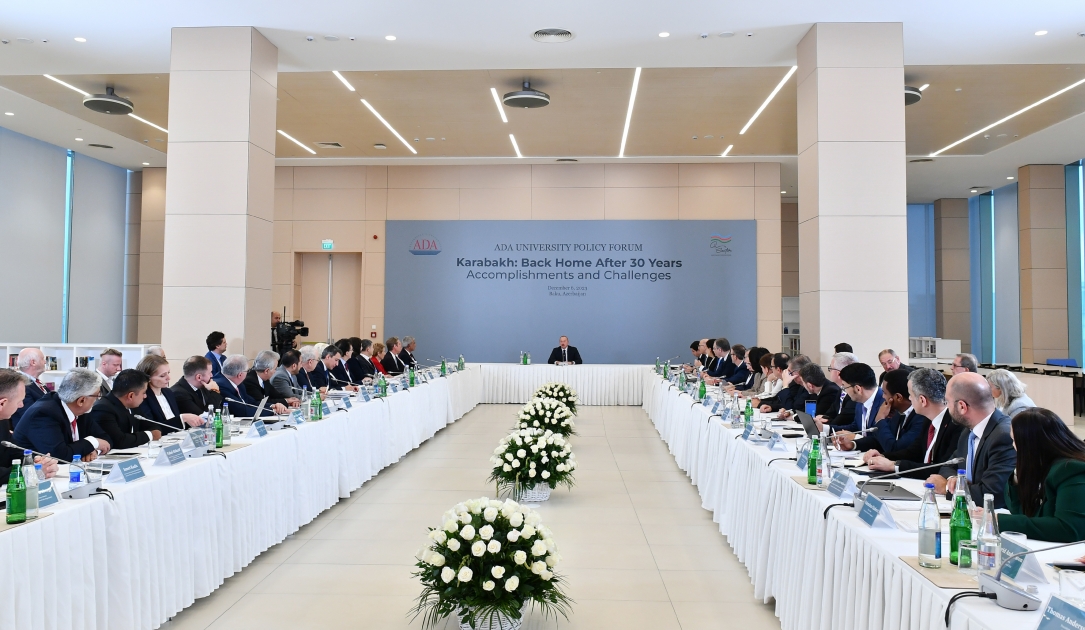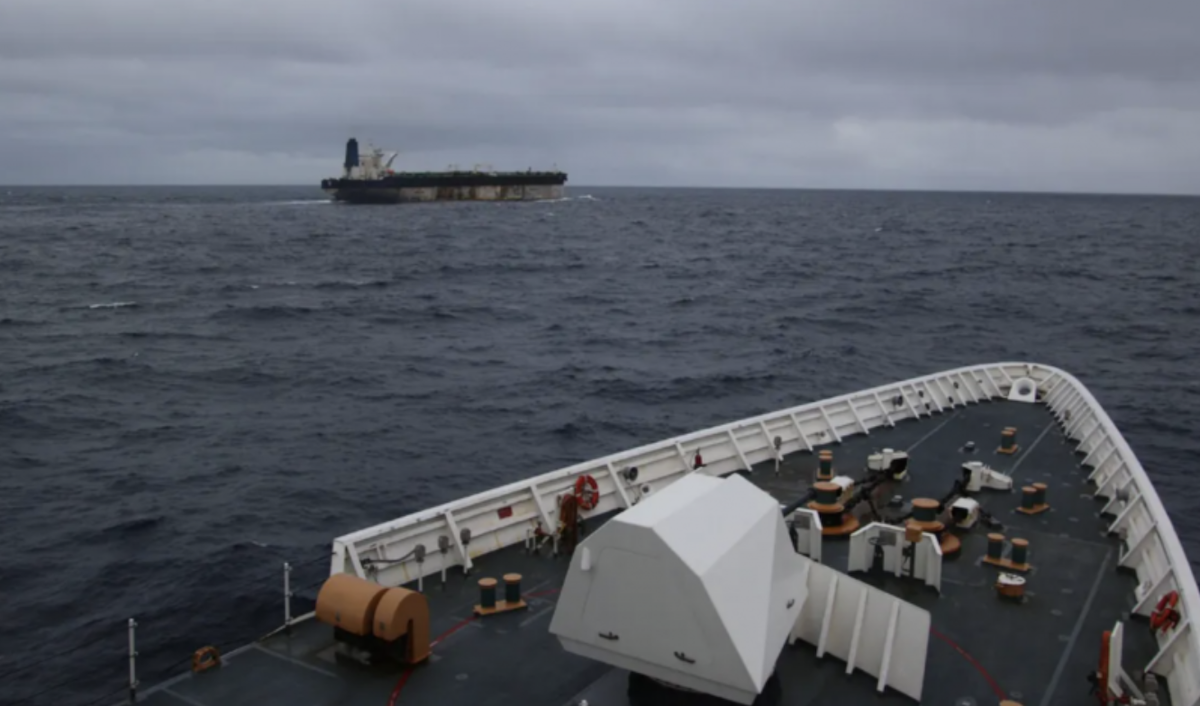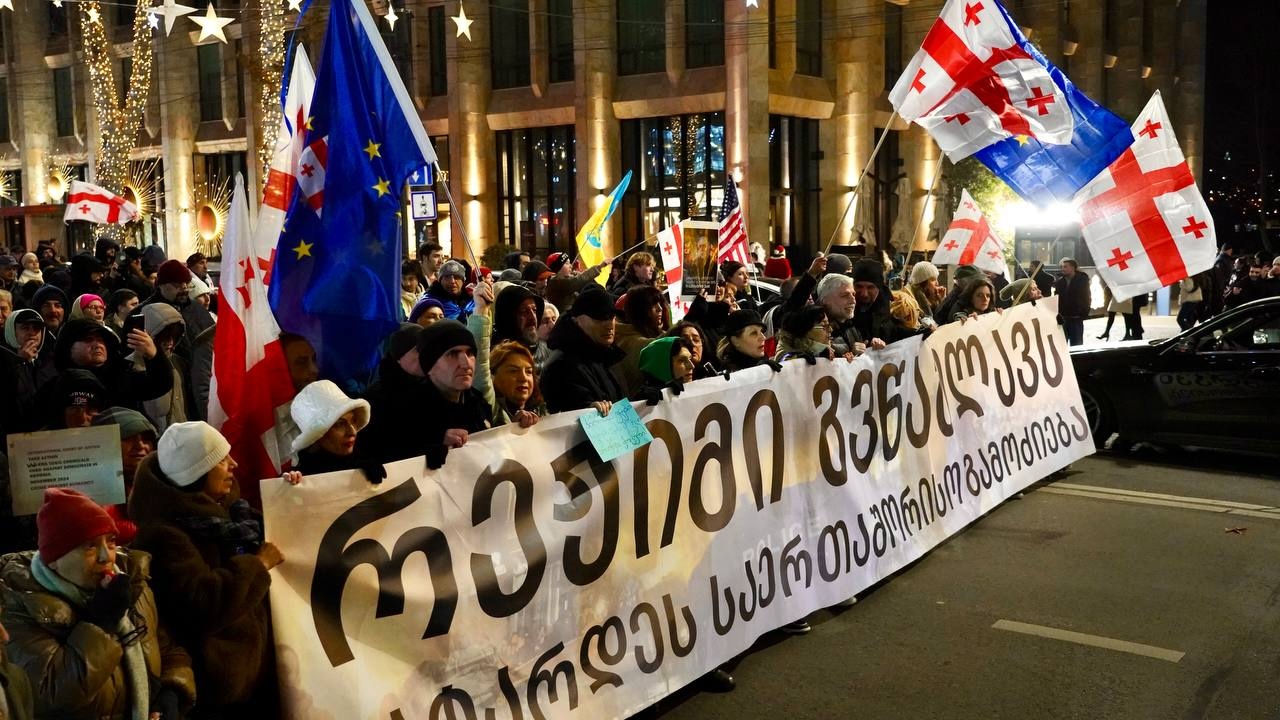Ilham Aliyev named two conditions for signing a peace treaty with Armenia
Aliyev at the Shusha Media Forum
Azerbaijani president Ilham Aliyev named the dissolution of the OSCE Minsk Group and amendments to the Armenian constitution as important conditions for signing a peace treaty between the two countries.
Responding to a question about possible negotiations between Ukraine and Russia, and the resolution of the conflict between these two states, Aliyev drew an analogy from Azerbaijan’s recent history. “There was a time when we had to agree to a ceasefire,” he said.
- Internet prices to increase in Azerbaijan starting August 15
- “The goal is not to bring Yerevan and Baku to a peace agreement”: Opinion
- Nailed to Russia: How Kyrgyz and Georgians are forced into foreign policy choices
On July 20, the second Shusha Global Media Forum opened under the theme “Exposing Fake Narratives: Combating Disinformation.”
Azerbaijani president Ilham Aliyev attended the forum and answered questions. The event was moderated by Rebecca McLaughlin-Eastham, a presenter and producer for Euronews.
The Azerbaijani JAMnews compiled the most interesting statements made by Aliyev in response to journalists’ questions.
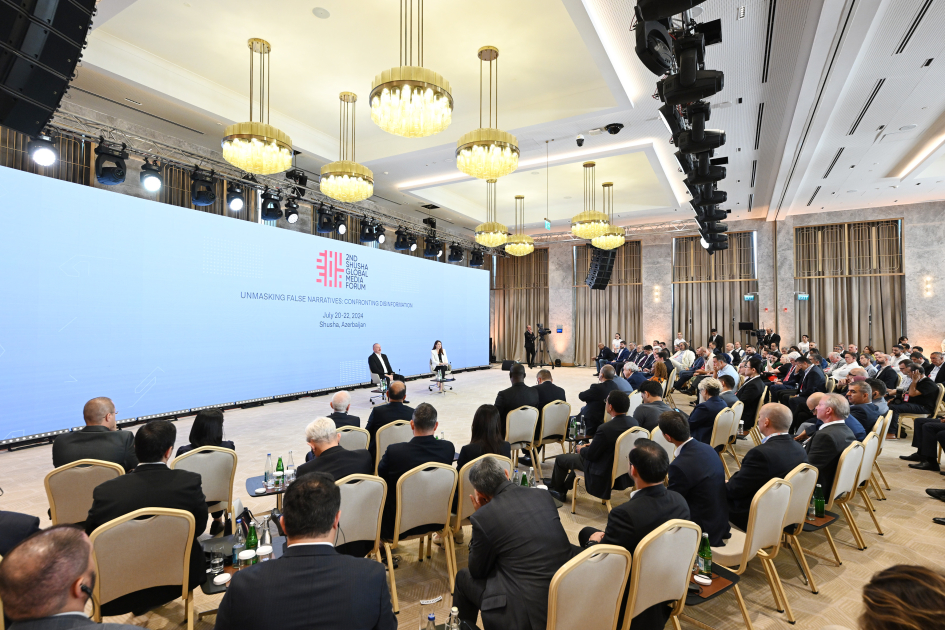
“Under him, America did not start wars”
In response to a question about disinformation in the media, Azerbaijani president Ilham Aliyev cited an example from American practice:
“Even the president of the United States faces what we have been experiencing for many years. President Trump called the Washington Post and the New York Times sources of fake news. And I fully agree with him—not only with this but with other statements as well.
So now the object of media persecution, media attacks, and manipulation of public opinion is the president of the United States. Seeing all this, we can relax a little. The attention is not on Azerbaijan right now.”
Aliyev was also asked about the U.S. presidential elections [at that time, Biden was still a presidential candidate—JAMnews]:
“We view this situation through our own lens. The decision will be made by the American people. It will be their president who is elected. But it also has huge importance for the entire world because the fate of many nations and countries will largely depend on the decisions made by the head of the United States.
One of the important points, I think, that president Trump emphasized during the ongoing campaign is that there were no wars under his administration. America did not start any wars during his term—no Vietnam, Korea, Yugoslavia, Afghanistan, Libya, Iraq, or Syria. As they say, to be continued. During that period, this didn’t happen. Well, that’s probably something that deserves a great deal of respect”.
“We want to see a peaceful South Caucasus”
Georgian journalist Gela Vasadze asked Aliyev: “What is your vision of the ideal Azerbaijan and South Caucasus today?”
“The geopolitical context in the world and in our region has changed dramatically, perhaps even more than one might imagine. In this case, Azerbaijan’s victory in Karabakh is not the only geopolitical shift.
When we talk about the countries of the South Caucasus, each of these countries has undergone significant political and foreign policy transformations, I would even say close to radical. Therefore, this is a new situation in the South Caucasus, and we need to understand it correctly.
Based on this understanding, and depending on how the foreign policy vectors of Georgia, Armenia, and Azerbaijan progress, we can formulate an answer to the question you posed—what kind of South Caucasus do we want to see? Of course, everyone will say that we want to see a peaceful South Caucasus, without wars, without conflicts, without territorial claims, where everyone loves each other and cooperates.
But these are all nice words, perhaps suitable for a toast, but not for real politics. At this stage, as a new foreign policy agenda is being formed in Georgia and Armenia, we need to clearly understand and analyze it. Since the foreign policy in Azerbaijan has not changed, and I am sure it will not change, we can then take steps to move towards at least some form of interaction, if not integration.
I have said many times that I deeply regret that the countries of the South Caucasus, which were involved in wars, could not follow the path of the Baltic states, which did not openly antagonize each other. If this had happened, I am sure that today the economic development and political interaction in the South Caucasus could be an example of cooperation. Because for centuries, the peoples inhabiting our countries lived side by side. But that didn’t happen, so there’s no point in dwelling on it. But now there is a chance.”
Two сonditions for signing a peace treaty
The president of Azerbaijan addressed the issue of a peace treaty with Armenia and outlined two conditions necessary for signing this document:
“Regarding the peace agreement, according to information provided by the Foreign Minister, 80-90 percent of the text has already been agreed upon. Armenia had to abandon its reservations and all the terminology related to the so-called Nagorno-Karabakh, which paved the way for normalization.
But there are two important issues that need to be resolved. At least for now, there are two. Firstly, Armenia must positively respond to our proposal for a joint appeal by Armenia and Azerbaijan to the OSCE to disband the Minsk Group, as this group has been effectively inactive for the past couple of years. There is no chance that the Minsk Group will become functional again.
Firstly, because the co-chairs are currently practically at war with each other, I mean two against one. Secondly, France has completely lost the chance to be a mediator or even to be present in the South Caucasus because they cannot act in the region without our consent. If they try to do so without our consent, they will fail again. And this will be yet another painful defeat for them. What is the point of maintaining the Minsk Group de jure under these circumstances?
As you know, the OSCE operates on a consensus mechanism. If Armenia wants to keep the Minsk Group de jure, then it will remain, but this means that Armenia’s territorial claims against Azerbaijan still exist. This is a very serious factor. It is a kind of litmus test…
Secondly, the amendment of Armenia’s constitution. And again, I want to emphasize that our actions are not an interference in their affairs, not at all. The constitution of Armenia contains references to the Declaration of Independence, which clearly presents a territorial threat to Azerbaijan, as it speaks of uniting the so-called Nagorno-Karabakh with Armenia.
So, as long as this clause exists, a peace agreement is impossible. And again, I want everyone to understand me correctly. This is absolutely not interference. But with this clause in their constitution, the agreement is impossible because the constitution is above any other document, including international treaties. Therefore, we do not want to end up in a situation where they might change their mind one day, and we would have to do what we did in September once again.”
“There was a time when we had to agree to a ceasefire”
Responding to a question from a Ukrainian journalist, the president of Azerbaijan shared his country’s experience as a potential resolution model for the conflict between Ukraine and Russia:
“Many mediation attempts are being made. But, of course, it will depend on the readiness of both sides to negotiate. I think that talking is always better than not talking.
During our confrontation with Armenia, if an analogy can be made, we had a continuous process. Yes, it was unproductive, but it was a process. There was a former Minsk Group, although we did not like what they were doing, and we absolutely rightly disliked them, but it was a process, negotiations. I met with the leaders of Armenia several times, including the current leader, his predecessor, and his predecessor’s predecessor. I had to do this. These two predecessors were directly involved in war crimes against Azerbaijanis, including the Khojaly genocide. And you can imagine how unpleasant it was for me to shake their hands, but I did it for the sake of peace and the liberation of our territories.
As a president, I had to set aside all my feelings and emotions. When you are in such a position, you must leave your emotions at the door. Did these meetings help restore our territorial integrity? I think they did. I don’t want to go into details, but I think many will understand. This helped us, and we regained our lands when we were ready to do so.
There was also a time when we had to agree to a ceasefire. This was in 1994. Believe me, it was not an easy decision.
Often, when my guests from Western countries ask me how this can be resolved, I say that my father loved Azerbaijan no less than I or any other Azerbaijani. But he agreed to a ceasefire in May 1994 and saved the country. Because at that time, Azerbaijan practically did not have a regular army. He had just started to create one. After him, we continued and created an army that we are proud of.”










